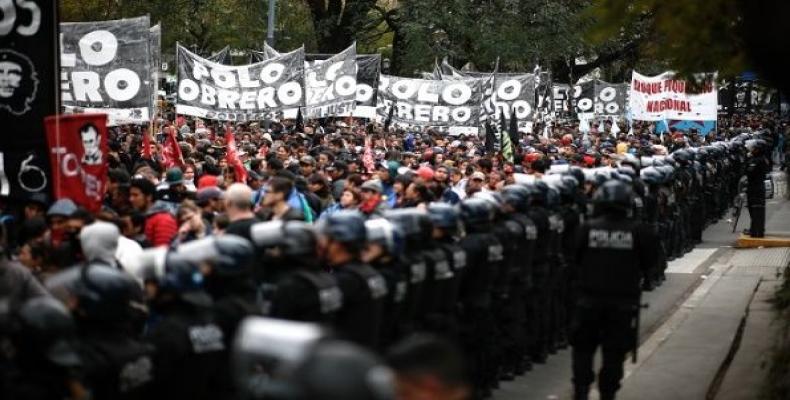Buenos Aires, September 13 (RHC)-- Argentina's police cracked down on members of social organizations who gathered in downtown Buenos Aires with the intention of camping at the city's most famous street, the 9 de Julio Avenue.
Banging pots and shouting against right-wing President Mauricio Macri, protesters demanded wage increases, jobs, food, and other "emergency measures so that the working people will not pay for the crisis."
The Argentinean congress finally approved the emergency measures, in a vote taken Thursday evening in Buenos Aires.
Earlier in the day, the police tried to disperse protesters for hours, to prevent them from installing their camp in front of the Social Development Ministry, but they failed. Hundreds of Argentinians remained protesting and took to the streets waiting for the Lower House to debate on Thursday a bill aimed at extending until 2022 the food emergency initially decreed in 2002.
Those demonstrations coincided with the Argentinian Teacher day, which was marked this time with people in the streets fighting to "end hunger" in the country. "Urgent. Police cracks down on social movements which were camping in front of the Health and Social Development Ministry."
"If you are starving, you cannot either teach or learn," the Union of Education Workers general secretary Eduardo Lopez recalled and denounced that only 25 percent of state workers have full labor rights.
In August, the Catholic Church also warned of severe increase in poverty levels and asked Macri to declare food emergency. So far, however, authorities have argued that there is already a emergency food law which is in force.
"Voting again for a law that has already been approved means that this government has left sectors without food," said Security Minister Patricia Bullrich, who believes that social activists are trying to convey the fake idea that Macri runs a "starve-the-people" government.
According to the latest report from the National Institute of Statistics and Census (Indec), however, the price of food will increase by 80 percent by December and most families will have a regular monthly income below US$228, which is the average cost of a basic food basket.
High inflation, low wages and widely spread unemployment are three factors which allow for predictions that at least 10 out of every 100 Argentinians will be in extreme poverty by the end of 2019.


